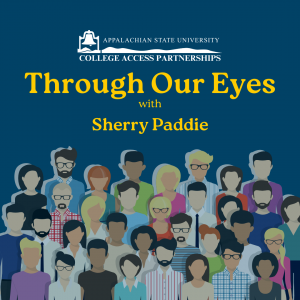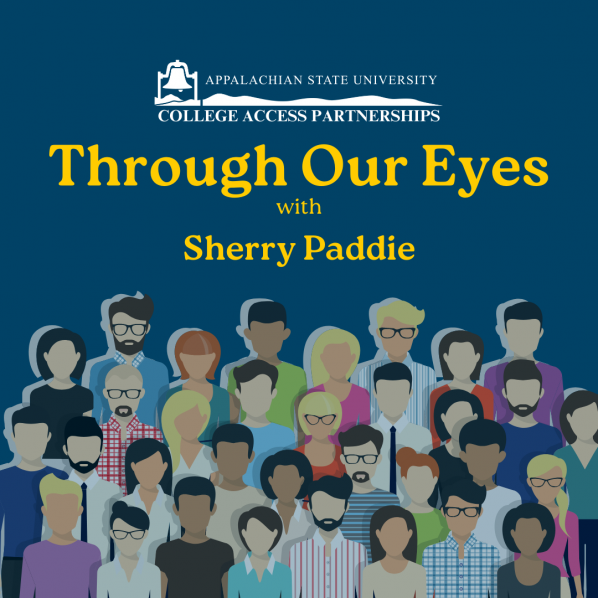In this series, we feature individual CAP staff members and dive into their unique perspectives on college access, education, the role of our grant programs in the community, and more. This month, we highlight Sherry Paddie, Navigator for Empowering Teacher Learning. Learn more about how Sherry and her team support teachers across the region and why she thinks CAP is at the forefront of research-based educational strategies in the state.
Tell us about yourself including your position, what you do, and how/why you got involved with CAP.
I am a former K-12 Special Education, English Language Arts, and Drama Teacher who spent most of my teaching career in the middle school grades. After teaching, I shifted my attention to social services where I was the director and volunteer coordinator of a food bank, Director of Student Outreach for the Wesley House at the University of Montana, Lead Advocate and Education & Outreach Coordinator for a domestic violence shelter in Montana and the Director of Mentorship and Empowerment at Arizona's Children Association where I was involved in programming for youth transitioning out of foster care. I am now serving as one of four "Navigators" for the Empowering Teacher Learning research project (ETL).
While there are specific duties that the Navigators are responsible for, the role of Navigator is a little bit hard to define because, by design, the bulk of our job is to provide support in whatever way individual teachers need. The way I like to describe it is that my role is to inform participating teachers about what it truly means to be a Self-Directed Learner and to guide participating teachers through the ETL project's process and the Canvas course we have developed. But the most important part I play is cheerleader for some of the most amazing middle school teachers in Watauga County and at Starmount Middle School in Yadkin County by providing encouragement, and unconditional, unbiased and non-punitive feedback and support.
What would you want people to know about the grant program with which you serve?
The ETL project is currently in year three of a five year Education and Innovation and Research grant. During this Early-phase of the grant, we have been working with individual teachers in 11 rural western North Carolina counties to determine if providing teachers with more autonomy, voice, and choice regarding the professional development in which they participate as well as paying them for the extra work necessary to fulfill the continuing education required will result in increased job satisfaction and teacher retention; leading to better student success outcomes. This project is especially important to me because, after 12 years of teaching in public schools, I was one of those teachers who gave up my career in education due to a lack of competitive pay and decreased time with family. As such, I am highly motivated to support the teachers who participate in this project. I am incredibly passionate about hearing their stories and providing encouragement, because I desire to see them appropriately rewarded for the work they do for our kids and therefore, the success of the ETL project.
What do you perceive to be the biggest point of pride for CAP?
I have a tremendous amount of pride in the ETL project. However, the ETL project would not exist without its parent department, College Access Partnerships (CAP). The CAP team is the biggest point of pride for me. The leadership as well as individual members of this team provide the foundation for the way we support the teachers participating in the ETL program. Our team proves that it is not only possible, but imperative to empower one another by providing advocacy, encouragement and any other type of support that is necessary. Peers within CAP prioritize cooperation and collaboration both within their own programs and among other programs. Whether individually, within programs, or one program supporting another, the CAP team exemplifies how autonomy and respect can improve performance and attainment of department goals.
How have you seen the impact of CAP in our community?
I have seen the impact of College Access Partnerships in many ways throughout North Carolina. What I experience the most is the impact that our work within the ETL project is having on teachers and school cultures in which we have participating teachers. Teachers and administrators within the program are demonstrating higher degrees of motivation and teamwork due to the support we provide. Many of the schools participating in ETL also participate in GEAR UP. Teachers appreciate the support both programs provide and the way they benefit the students. They (and we) anticipate further collaboration between our programs on school campuses in order to provide the highest degree of opportunity and support for students. On an individual level, CAP team members are also having a huge impact on our community. Particularly in the aftermath of Hurricane Helene, many of our teammates were boots on the ground, volunteering to help in various clean-up and support capacities. This demonstrates the passion for people and the commitment to service that is characteristic of members of the CAP team.
Please share your thoughts on the role of CAP as it pertains to the future of education.
I am incredibly excited about the potential of CAP to improve the future of education in North Carolina and abroad.
Our programs are having a direct, positive impact on hundreds of teachers and students in North Carolina. We are modeling and participating in the most progressive, research-based educational strategies available; thanks in no small part to our stellar research team.
In addition, our partnership with state influencers in education such as the North Carolina Department of Public Instruction, the Friday Institute, other members of the greater University of North Carolina System, and many others are strong and growing. They are watching and listening as we demonstrate current best-practices in the field of education. Many of our team members participate in the North Carolina Education Policy Fellowship Program sponsored by the North Carolina Public School Forum. This opportunity prepares participating members for leadership roles creating, supporting and/or advocating for future education policy. Our influence has already gone beyond the state of North Carolina and even beyond the United States. Earlier this year, ETL Navigators presented at the International Society of Self-Directed Learning where we exchanged ideas with educators from other states as well as places like Estonia, Mexico and Japan to name a few. One of the ETL Navigators was even invited to present and demonstrate our program components at Athens College in Athens, Greece where she helped to increase our cooperation with them. I am extremely hopeful about the future of CAP and the difference we will continue to make going forward.
Sherry with Fergus (her self-proclaimed best bud and travel companion)
Sherry with her family (2 daughters, grandson, and son-in-laws)

